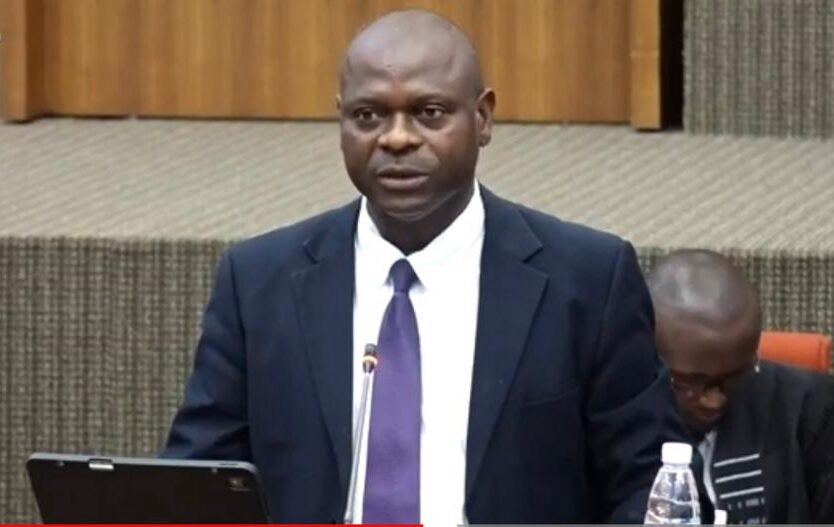By Musa S. Sheriff
The Minister of Finance, Seedy Keita, has said that despite the global economic challenges that threatened to slow down the gradual recovery from the COVID-19 pandemic, the Gambia’s economy has displayed remarkable resilience.
The finance minister made this statement as he delivered the 2024 Budget at the National Assembly on Friday under the theme Consolidating Recovery and Accelerating Reforms towards Building Economic Resilience and Improving the Wellbeing of The Population.
He explained that the global economic challenges that the economy grappled with include the lingering effects of the COVID-19 pandemic, the spillover effects of the Russia-Ukraine War, and the growing impacts of climate change and adverse weather events, adding that the combination of these multiple and overlapping exogenous shocks led to disruptions in global supply chains, high volatility in global financial markets, high inflationary pressures fueled by rising food and energy prices, tightening of global financial conditions, and increasing cost of capital and debt servicing.
According to him, the impact of these shocks was reflected in the decline of the country’s real GDP growth, which is estimated to have slowed to 4.9 percent in 2022 from 5.3 percent in 2021.
“Although this growth rate is lower than the country’s pre-pandemic level of 6.2 percent in 2019, it is stronger than the world average of 3.4 percent and surpassed regional performance of 3.6 percent in West Africa, underscoring the country’s resilience despite the extraordinary challenges in navigating these adverse shocks,” minister Keita said.
He pointed out that tighter global financial conditions in response to multi-decade highs in global inflation rate are adversely affecting the country’s macroeconomic fundamentals, generating foreign exchange shortages, weighing on forex reserves, and exerting pressure on the Dalasi, adding that the situation was aggravated by the negative effects of high food and fuel import bills, disruptions of cashews, and elevated freight costs on balance of payments.
The finance minister stated that added to high global food and energy prices, strong domestic demand strengthened inflationary pressures in the country.
“Inflation reached a record-high level of 18.5 percent (year-on-year) in September 2023, but this was reduced to 18.05 percent in October 2023,” he added.
According to him, this macroeconomic environment makes fiscal policy management and consolidation efforts more difficult as the Central Bank of The Gambia increased its policy rate to curb inflationary pressures.
“The Government of The Gambia intervened using both fiscal and monetary policy instruments to sustain macroeconomic stability and lessen the spillover effects of these global economic challenges on the domestic economy,” he explained.
“From January to end-November 2023, the Government through the CBG conducted foreign currency interventions of US$59.28 million to ease supply-side constraints and support the importation of essential commodities that reached critically low stock levels. The Government also tightened its monetary policy stance, increasing its policy rate by 4 percentage points over the year to curb rising price levels,” he added.
On the fiscal front, Minister Keita revealed that as of the end of October 2023, the Government provided subsidies on fuel products to the tune of D479,190,237.89 to ease the effects of high global fuel prices on the lives of the citizenry. “While this gave much-needed assistance to the Gambian population, it also meant over D479 million of forgone revenues for the government, which is unsustainable given our limited fiscal space,” he stated.
Minister Keita further revealed that in addition to fuel price subsidies, the Government made other fiscal interventions,including the provision of substantial subsidies on food and agriculture inputs amounting to D664,499,675 to support domestic production and to ease the effects of high global food prices on vulnerable households.
He also said that the 30 percent basic salary increment,implemented last year, is also helping civil servants cope with the increasing cost of living.
“That said, it is imperative to note that it has been a challenging task striking a balance between fighting the downside effects of recent global economic developments and keeping the economy on a sustained growth path.
“In the face of uncertainties on global economic developments, prudent policy response is essential to strengthen the country’s economic fundamentals as the main input to Consolidating Recovery and Accelerating Reforms Towards Building Economic Resilience and Improving the Wellbeing of The Population. Reforms in key sectors remain critical to strengthening resilience and growth in the medium term,” Minister Keita pointed out.





